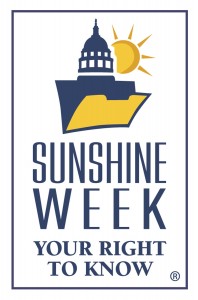|

Have lunch with VCOG (virtually) and learn about making requests for records with FOIA. Celebrate Sunshine Week with our Facebook Live(and a work in progress) event tomorrow at 12:30.
|
For nearly four hours, while members of the State Water Control Board huddled with their attorney behind closed doors, observers we re left to wait and wonder what the board would do about the Mountain Valley Pipeline. They eventually found out what, but they’re still asking why. At a March 1 meeting, the citizen panel charged with protecting Virginia’s water voted to withdraw its earlier decision to hold a hearing on whether to revoke a water quality certification it issued for construction of the natural gas pipeline in December 2017. After emerging from a closed session, several members expressed concerns that the board lacked authority to revoke the certification. Two members of the water board — Robert Wayland, who at first favored a revocation process, and Timothy Hayes, who did not — agreed to speak individually with The Roanoke Times following the March 1 meeting. Neither would discuss what was said during the board’s closed session. But they offered explanations for the public statements made at the meeting, when several members questioned the panel’s authority to revoke the certification.
The Roanoke Times
The Virginia Beach City Council will likely take applications and interview candidates to fill the Beach District seat after three judges determined David Nygaard can no longer serve because his win was invalid. The council plans to discuss its next steps during a public meeting on Tuesday. The council will be responsible for filling the spot and that person would serve until a special election is held — likely in November. On Friday, the Circuit Court issued an opinion finding that Nygaard, a 55-year-old jeweler, didn’t plan to live at a duplex he rented before he ran for office. The judges deemed that Nygaard didn’t meet the residency requirements to be eligible to run. Mayor Bobby Dyer said he would like the council to interview all of the candidates in public.
The Virginian-Pilot
To commemorate Sunshine Week, we put together a list of stories that would have been impossible to tell you without the Freedom of Information Act or public statistics. The incidents described in ‘They Didn’t Shoot’ were within records requested by Watchdog Coach Jeff Schwaner. “It took some back and forth from the three law enforcement offices but they eventually provided the data, which was the basis for further investigating into the story,” said Watchdog Coach Jeff Schwaner. Records helped shine light on how and why kids are restrained in Virginia. Without multiple local and state level Freedom of Information Act requests, reporters Fair and Schwaner wouldn’t have been able to tell the public the following:
The News Leader
Becoming a candidate for office is much more complex than in the past, especially when it comes to campaign finance requirements. For that reason, Virginia Department of Elections (ELECT) is offering a series of training seminars this month, including one in Christiansburg. The seminars last about two hours and are geared toward candidates and their staff and treasurers, as well as political committee treasurers. Training addresses laws and policies governing campaign finance reporting and compliance.
The Southwest Times
|